You can find an eCommerce business to sell you just about anything these days. Need supplies to keep you safe in the event of a zombie apocalypse? There's an eCommerce business for that. A business suit onesie? Yep, that too. A scratchpad for your cat that looks like a DJ setup? Of course.
The fact that there are so many eCommerce niches out there is a good thing. It means that there's an audience for any product—including yours! In fact, digital buyer penetration worldwide is estimated at 65.2%, according to eMarketer. That's a huge percentage of global internet users who purchase products online.
But finding the right eCommerce niche from everything that's out there can be daunting. And, you may be wondering if you even need to choose a niche at all. The good news is that we've done the research to find out the benefits of choosing an eCommerce niche, what to consider when looking for that perfect niche, and have even rounded up 10 of the most profitable eCommerce niches in 2022.
10 eCommerce Niches to Help You Build Your Empire:
What Are eCommerce Niches?
eCommerce niches are specialized segments within an industry. This could be something like eco-friendly products, technology, CBD, and other products or services. Niches can go deeper than just the products you sell, too. You can further niche by providing specific products to specific market segments based on:
- Demographics like age, gender identity, education, income, etc.
- Location
- Psychographics like behaviors, interests, attitudes, lifestyle, etc.
- Pricing (high-end vs. affordable products, for example)
As you can probably tell, niching makes your potential pool of customers smaller. So...
Why Niche?
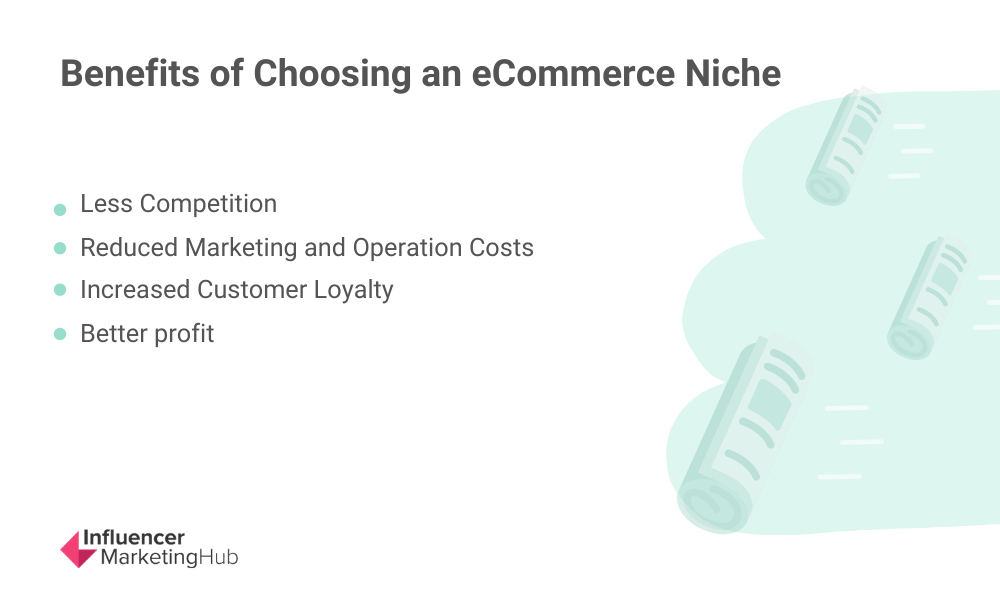
Even though niching will reduce your potential customer base, there are several benefits that come from choosing an eCommerce niche. Let's take a look at four benefits of choosing an eCommerce niche.
Less Competition
Finding your eCommerce niche will help you limit how many other sellers you're going to be competing with. This means you'll be able to draw in and keep your customers. In order to do that, though, you'll want to put in the work to offer interesting, useful, and fun products that fill a need your competitor's products don't. It's also helpful to build authority in your niche and build your brand around that.
Reduced Marketing and Operation Costs
When you niche, you'll be limiting the number of products you'll need to create marketing for and the size of the audience you'll need to market to, reducing your overall eCommerce marketing costs. In addition to reducing marketing costs, using eCommerce niches is less expensive in other ways. For example, you're likely to have fewer products so you won't need as much space for storage as you would if you sold a broad range of more general products. Plus, you'll have a smaller product line to share across all of your marketing and sales channels.
Increased Customer Loyalty
eCommerce niches can also lead to better customer loyalty. Since you're not trying to appeal to a broad, general audience, you'll be able to create messaging that's highly targeted to your specific audience. This type of targeting goes a long way towards endearing customers to you. Combine that with your work to add value to your customers' lives and become an authority in your niche, and your customers will stick around not only because they like your product, but because they also trust you.
Better Profits
It seems counterintuitive. How can selling a smaller number of products to a smaller audience result in higher profits and a better ROI? There are two specific things about eCommerce niches that make it make sense, though: production and availability (or scarcity). When your product solves a specific and unique problem for a specific and unique audience, it's likely that the product will be of higher quality ("small batch," "sustainable," and "by hand" are some watchwords here).
When it comes to availability and scarcity, because your product is specialized and niche, you're likely one of just a handful of brands offering that product. Since it's not readily available everywhere, you'll be able to charge more for it.
Plus, that customer loyalty we just talked about feeds into profits.
Finding the Right eCommerce Niche
Okay, you're convinced. eCommerce niches are the way to go. But now you want to make sure you find the right one. Here are five tips that will help you find just the right niche for your eCommerce business.
1. Go With What You Know and Love
What are you passionate about? Sure, you could just choose a profitable niche and go for it. But, if you're truly inspired by and interested in what you're selling, you'll have a much better time marketing it and running your business. And you'll have a better understanding of the products so it will be easier to connect with your customers.
2. Check the Trends
What's popular? A simple, free tool like Google Trends can give you a great idea about the amount of interest there is in an eCommerce niche you're considering. Google Trends will show you searches over time for your potential niche as well as interest by location. Here's an example for "eco-friendly products:"
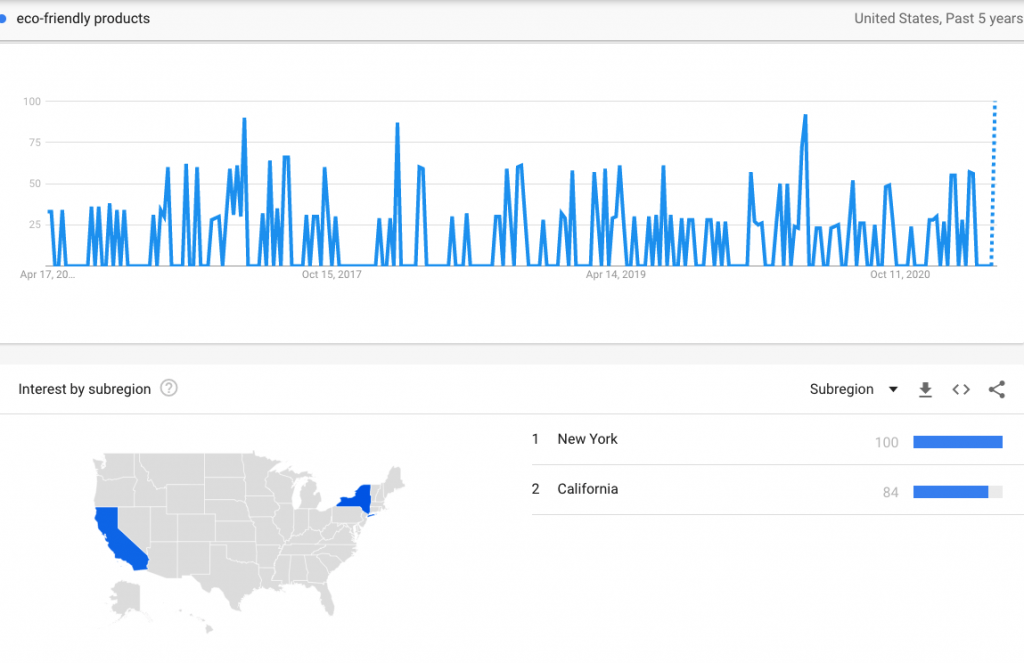
You'll notice that interest in "eco-friendly products" is prominent in a couple of states. Interestingly, "eco-friendly cleaning products," an even narrower niche, is most popular in an entirely different state:
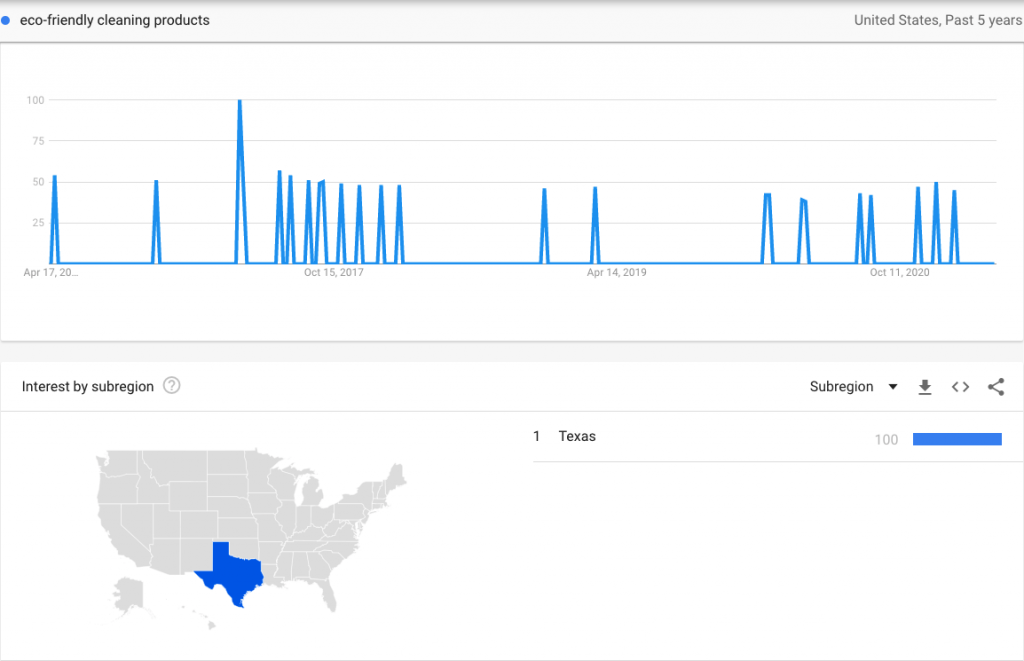
If you already have a specific geographic location in mind, you can run reports based on that. Want to go global with your eco-friendly products? Google Trends can help you decide where you want to spend your marketing budget:
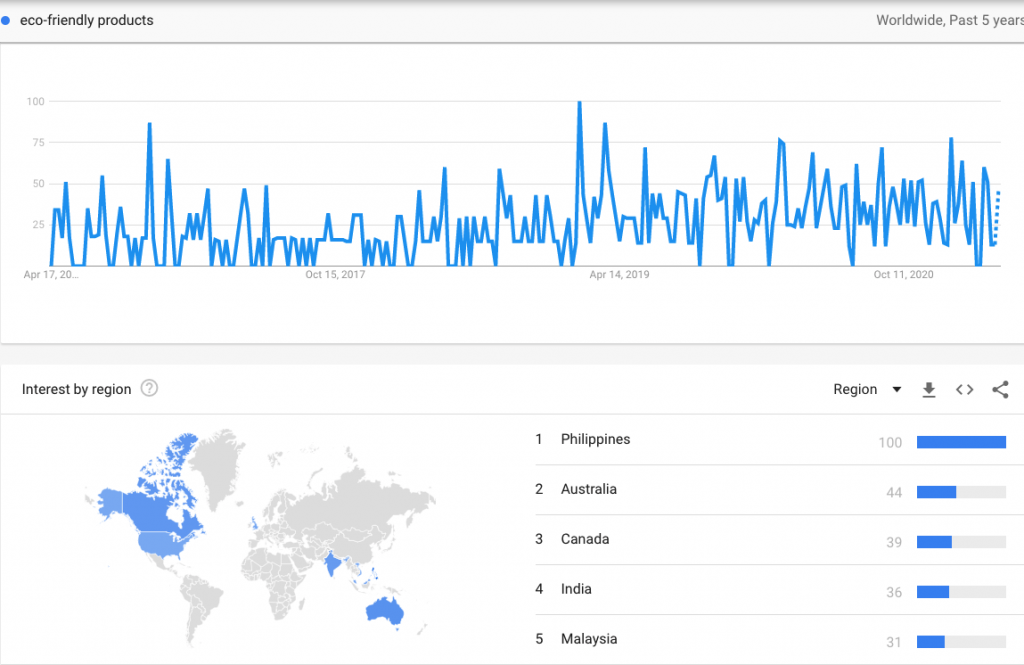
3. Do Some Keyword Research
In addition to checking out Google Trends, it pays to do some keyword research about your potential eCommerce niche. Google has a Keyword Planner as part of Google Ads that you can use whether or not you plan on running ads. Search volume is a great indicator of how profitable eCommerce niches will be. If search volume is low, it's probably not a profitable niche. Higher search volumes can equate to product demand.
Let's take look at search volumes for our keywords from Google Trends, above:

As you can see, both of those keywords have a decent search volume and could definitely work as an eCommerce niche.
4. Choose Products With High Profit Margins
Since you have a smaller market to work with, eCommerce niches need products that have a higher profit margin. There's a formula for calculating gross profit margin and net profit margin, and those things are important. But when you're just starting out, trying to choose which products to carry, you might not want to fuss with it. What then?
You can look at the cost of a single product vs. how much people are willing to spend for that product to get a little bit of an idea of whether or not the product will be profitable for you. This doesn't take into account things like marketing, shipping, storage, and the like, so it's not going to be precise. However, it will at least give you a general idea of how much you might make from the sale of each product.
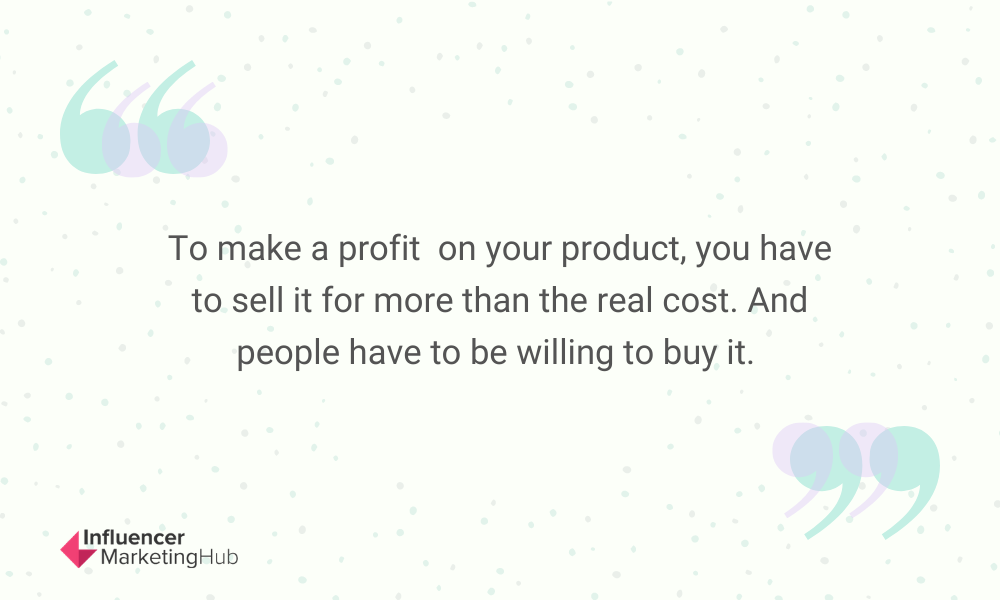
5. Don't Just Sell One Product
When you're creating an eCommerce business, it can be tempting to start out with just a single product. We recommend choosing an eCommerce niche and a few products that fit that niche instead of selling just one product. If you're only selling one thing you run the risk of having to shift gears quickly if that product's popularity declines. If you have a handful of products on offer, it can give you time to find, source, and start marketing other products as the market's interests naturally ebb and flow.
10 Best eCommerce Niches in 2022
As you can imagine, there are thousands upon thousands of eCommerce niches to choose from. And, as more and more products are created, this number is only going to rise. Of course, not all eCommerce niches are created equal. Some are naturally easier to market, some have higher profits, some are more readily available (and easier to source). However, there are some eCommerce niches that either tend to perform well over time or are having a trendy moment right now. Let's take a look at 10 of the best eCommerce niches in 2022.
1. Technology and Home Office Equipment
Remote work has been increasing over the past several years—even before a global pandemic sent companies scrambling to make their work environments remote-friendly. According to Pew Research, about 20% of employed adults worked from home before 2020 (41.8% if you include self-employed people, per Upwork). Currently, the number of employed adults working from home is a whopping 71%.
That means there's a market for home office equipment and technology. Plus, when you consider that 74% of companies will be keeping at least some of their employees remote even after COVID-19 is under control (Gartner), the demand for these products will only continue.
There are a few great options to focus on in this niche, like home office furniture, hardware, and even software that makes remote work easier for teams.
2. CBD

CBD (cannabidiol) has gone from a new-agey product to mainstream. And people are using it for everything from keeping their pets calm to calming their own nerves as we navigate a pretty strange time. Plus, CBD is sometimes recommended for pain management, too.
CBD products derived from hemp plants and with a THC concentration of less than 0.3% are legal in all fifty states in the United States, but it's not legal everywhere. If you want to get in on this eCommerce niche, you'll definitely want to check out the legalities and if there are any special licenses needed to sell it in your state or country.
3. Beauty and Health Products (General)
Beauty and health products are one of the eCommerce niches with the most longevity. Plus, the industry is regularly listed as one of the fastest-growing industries online. The industry as a whole has an annual compounded growth rate of 4.75% worldwide and revenue is up to $511 billion in 2022 from $483 billion in 2020. Estimates put revenue at $784.6 billion by 2027 (Statista).
A bonus is that there are several different products within the beauty and health niche: makeup, skincare, haircare, and more.
4. Men's Skincare and Beauty Products

While you could lump this eCommerce niche in with the general beauty and health products niche, men's skincare and beauty products have really taken on a life of their own over the past several years. This niche includes things you'd expect, like beard care and shaving supplies, there's a growing market for skincare and beauty products like moisturizers, lip balm, exfoliants, and more designed specifically for those who identify as men.
5. Natural Skincare and Cosmetics
Can you tell that health and beauty is big business? Here we have yet another eCommerce niche related to the industry, this time focusing on natural and organic products. According to Grand View Research, the global natural skincare products market size was valued at $10.84 billion in 2019 and is anticipated to grow at a compound annual growth rate of 5.0% from 2020 to 2027. Natural skincare and cosmetics can include vegan and cruelty-free products, natural toothpaste, soaps, and any number of natural and organic alternatives to standard beauty products.
6. Recommerce
Resale is another eCommerce niche that's enjoying an upward trajectory. With recommerce, you sell secondhand, used items. According to research by ThredUp and GlobalData Retail, the resale apparel market alone is valued at around $28 billion and is forecast to reach $64 billion by 2025. When you consider the entire circular economy, you're talking about a $4.5 trillion market.
7. Home Gym and Fitness Equipment

Fitness is one of those eCommerce niches that is always popular. While working out at home has always been popular, it became necessary as gyms closed worldwide due to COVID-19. But even as things are opening back up, people aren't quite ready to head back to their gym just yet. And, many people have realized that they don't even need their gym. With this eCommerce niche, you can focus on things like treadmills, exercise bikes, weights, or even supplements, protein powders, and meal replacements.
8. Eco-friendly Products
Over time, we're becoming more and more environmentally conscious. As such, there has been a huge increase in the number of eco-friendly and natural products out there being offered up as alternatives to traditional products. This includes things like natural deodorant, products made from bamboo, plastic-free cleaning products or reusable cleaning products, and a lot more.
9. Online Education

Online education is another eCommerce niche that has enjoyed increased demand over time. This isn't surprising when you consider the advances in technology that have made access a lot easier. Add into that a global pandemic and you can understand why there's been a shift toward online learning options. According to Research and Markets, the global online learning market is expected to have a CAGR of 9.23% to reach a total market size of $319.167 billion in 2025, up from $187.877 billion in 2019. Check out these online learning platforms for an easy way to create your own online courses.
10. Pet Products
We love our pets. In fact, we love them so much that total pet market sales have steadily increased in the United States over the past several years. In terms of pet food alone, US consumers spent roughly $42 million in 2020. The entire pet products and care industry is set to exceed $100 billion in the United States in 2022. Within the pet products niche, you have the option to niche even further and focus on pet food, apparel, CBD products for pets, subscription boxes, pet safety products, and more.
Choose the Right eCommerce Niche for You
There are several eCommerce niches that can provide a lucrative business opportunity. By employing the eCommerce tips we've included in this article, you'll be able to use a data-driven approach to ensure that the eCommerce niche you choose is going to be profitable for you. Plus, with the eCommerce niches we've shared, you're off to a great start in terms of making the right choice. Once you've chosen your perfect niche, you'll want the perfect tools to help you get started. Here are our picks for the best eCommerce platforms to help you build your online store.


